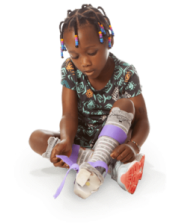What kind of doctor treats cerebral palsy?
 Cerebral palsy specialists include neurologists, developmental behaviorists, genetic specialists, and pediatricians.
Cerebral palsy specialists include neurologists, developmental behaviorists, genetic specialists, and pediatricians.
Because symptoms of cerebral palsy (CP) can range from mild to severe and often mimic other disorders, it can take months or years for general doctors or parents to recognize the condition.
As a result, working with cerebral palsy specialists can mean getting your child a prompt and accurate diagnosis so they can begin treatment without delay.
Cerebral palsy doctors and other professionals diagnose CP by evaluating your child’s symptoms and ruling out other conditions like autism or epilepsy. This thorough process ensures your child receives the right care and support.
Sometimes, cerebral palsy can be linked to preventable complications during childbirth. When medical negligence is involved, families may be able to file a cerebral palsy lawsuit to seek compensation to help cover the cost of care and provide financial stability.
Cerebral Palsy Guide has helped families across the country secure over $1 billion from birth injury lawsuits, including those involving cerebral palsy.
Find out if we can help your family, too, with a free case review right now.
Doctors and specialists for cerebral palsy
Caring for a child with cerebral palsy often involves working with medical professionals who bring specialized expertise. These experts can diagnose the condition, manage cerebral palsy symptoms, and address developmental needs.
Learn more about cerebral palsy doctors and specialists below.
Pediatricians for cerebral palsy
Your child’s pediatrician will play an important role in diagnosing early signs of cerebral palsy. Pediatricians assess your child’s physical and neurological development to ensure they are meeting age-appropriate milestones. Screenings are typically done at 9, 18, and 24 months.
Talk to your pediatric specialist if you have noticed your child missing any important milestones like rolling over, crawling, sitting, standing, or speaking.
- Can your child hold their head up?
- Are they rolling over without assistance?
- Do they seem visually and audibly responsive?
- Can your child sit up on their own?
- Have they started crawling at the appropriate age?
- Is your child walking within the expected time frame?
- Are they able to pick up small objects?
Your child's primary care doctor can regularly assess posture, reflexes, and muscle tone to find and monitor any delays.
If your pediatrician determines that your child is not meeting important developmental milestones, they will likely give referrals to cerebral palsy specialists who will be able to observe your child further.
Cerebral palsy neurologists
Cerebral palsy doctors who specialize in neurology play an important role in managing the motor challenges caused by the condition.
These cerebral palsy specialists focus on how the brain affects movement, muscle tone, and coordination, creating treatment plans tailored to each child’s needs.
- Collaborating with a care team to coordinate the best support
- Identifying motor challenges like spasticity or muscle stiffness
- Managing muscle tone through medications or other treatment
However, some neurologists may have limited experience with treatments for muscle tone, like medications or surgeries, according to a recent study in Pediatric Neurology.
As a result, combining the expertise of neurologists with other cerebral palsy doctors ensures children get the best care possible.
Diagnosing cerebral palsy can be challenging, and finding the right neurologist is an important step. If you have questions about your child’s diagnosis, we’re here to help.
Connect with one of our on-staff registered nurses for free, with no obligation.
Developmental behavioral specialists for cerebral palsy
These cerebral palsy specialists focus on how CP affects a child’s ability to learn, grow, and interact with others, providing support for both children and their families.
Developmental behavioral specialists also help children with CP by addressing co-existing conditions that often accompany the disorder.
- Attention deficit hyperactivity disorder (ADHD)
- Autism
- Dyslexia
- Epilepsy (seizure disorder)
- Feeding problems
- Incontinence issues (unable to hold/control bladder)
- Sleep disorders
Developmental behavioral cerebral palsy specialists work closely with other medical professionals to create care plans tailored to each child’s needs.
They provide care in hospitals, clinics, schools, and community centers, making their services accessible to families. Their goal is to help children with CP reach their full potential.
Genetic specialists for cerebral palsy
Up to 25% of cerebral palsy cases may have a genetic cause, according to a report from Harvard Medical School. This challenges the traditional view that CP is usually linked to birth-related factors like oxygen deprivation or prematurity.
Cerebral palsy specialists focused on genetics use advanced testing to identify these underlying conditions, leading to more accurate diagnoses and personalized care plans.
Consulting a genetic cerebral palsy specialist is especially important for:
- Birth defects or family history of neurological conditions
- Children with CP without clear causes like prematurity or brain injury
- Worsening symptoms that suggest a progressive condition
A genetic diagnosis can guide treatment referrals to other cerebral palsy specialists and provide families with clarity about the origins of their child’s condition.
Advances in genetic research continue to improve understanding and care for children with CP.
How to choose the right specialists for cerebral palsy
Finding the right cerebral palsy specialists is an important step in ensuring your child receives the best possible care to improve their prognosis.
The ideal specialist should have experience treating cerebral palsy and addressing your child’s unique needs.
Here are tips for choosing cerebral palsy specialists:
- Ask for referrals from your pediatrician or other parents.
- Choose specialists experienced in treating kids with CP.
- Find doctors who explain care plans clearly and keep you informed.
- Look for specialists nearby or those offering telemedicine options.
A team of the right cerebral palsy specialists can work together to create a personalized care plan, improving your child’s overall quality of life.
Questions to ask doctors for cerebral palsy
When meeting with cerebral palsy doctors, it’s helpful to prepare questions to ensure you’re fully informed about your child’s care.
Consider asking cerebral palsy doctors these 6 questions:
- What experience do you have treating children with cerebral palsy?
- How will you address my child’s specific challenges, like mobility limitations?
- What treatment options do you recommend for improving my child’s quality of life?
- Are there therapies or specialists you suggest adding to my child’s care team?
- How can I monitor my child’s progress and ensure their needs are being met?
- What resources or support systems are available for families?
Asking the right questions can help you feel confident in your choice of cerebral palsy doctors and ensure your child gets the comprehensive care they need.
Best hospitals for cerebral palsy care
When seeking advanced treatment for cerebral palsy, several hospitals are recognized for their specialized programs and comprehensive treatment options.
These facilities take a multidisciplinary approach to meet the unique needs of children with cerebral palsy, offering advanced therapies and family-focused care.
- Boston Children’s Hospital (Massachusetts): Known for its team-based approach, focusing on mobility and quality of life
- Children’s Hospital of Philadelphia (Pennsylvania): Recognized for advanced therapies and family-centered care
- Children’s National Hospital (Washington, D.C.): Focuses on neurological care with access to cutting-edge research
- Cincinnati Children’s Hospital Medical Center (Ohio): Offers comprehensive cerebral palsy care and innovative treatments
- Kennedy Krieger Institute (Maryland): Specializes in neurological and developmental disorders with personalized rehabilitation programs
- Massachusetts General Hospital (Massachusetts): Provides expert care for motor challenges through its Pediatric Orthopaedics department
- Mayo Clinic (Minnesota, Florida, Arizona): Offers advanced therapies with expertise in neurology and orthopedics
- Texas Children’s Hospital (Texas): Provides a full range of services, including therapy and surgical options for cerebral palsy
Traveling to these top hospitals can be costly, but many families believe the specialized care their child receives is invaluable.
If your child’s cerebral palsy was caused by medical negligence, pursuing legal compensation may help cover these expenses and provide the financial support your family needs.
Get a free case review right now to see if you could be eligible.
Therapists for continued care of cerebral palsy
Managing CP often involves adding various therapists to your child’s team of cerebral palsy specialists. These skilled professionals can help reduce symptoms, improve overall health, and increase independence by building skills for daily tasks and communication.
The type of therapists your child should work with depends on their needs, the severity of their condition, and which type of CP your child has. Learn more below.
Physical therapists for CP
Cerebral palsy doctors usually recommend physical therapy for children to improve mobility, balance, flexibility, coordination, and muscle tone. Physical therapy can also be used to prevent future complications caused by mobility issues, like scoliosis or hand/wrist deformities.
Trained therapists use assistive devices, specialized equipment, and targeted exercises to help children manage spasticity and tightness.
Physical therapists help younger children become more active through play. For older children, they focus on improving motor control and movement.
Occupational therapists for CP
Cerebral palsy occupational therapy aims to improve physical and cognitive abilities as well as fine motor skills. The goal of occupational therapy is to help children with cerebral palsy learn skills to complete everyday tasks and activities independently.
Occupational therapists will help children practice daily tasks such as eating or picking up small objects with specialized equipment. These practices encourage self-sufficiency and help transition children into adulthood.
Cerebral palsy speech therapists
Speech therapists for cerebral palsy help children overcome communication challenges and manage difficulties with eating or swallowing.
These cerebral palsy specialists are essential, as more than half of kids with CP experience speech or feeding issues.
Speech therapists for cerebral palsy focus on:
- Articulation: Pronouncing words clearly
- Breath control: Improving voice strength and clarity
- Feeding and swallowing: Ensuring safe eating and drinking
- Nonverbal communication: Using assistive devices or sign language
- Social communication: Building conversational and interaction skills
- Stuttering: Managing speech fluency issues
- Vocabulary development: Expanding word knowledge and usage
- Word comprehension: Understanding spoken language
Cerebral palsy specialists often refer children to speech therapists to improve communication and build confidence in daily interactions.
Stem Cell Therapy for CP
Cerebral palsy specialists are researching stem cell therapy as a potential treatment to address brain damage caused by the condition. This experimental approach aims to repair or replace damaged brain cells and support the function of healthy cells.
There are various types of stem cells used in studies, including mesenchymal stem cells (MSCs) from umbilical cord tissue and embryonic stem cells from early-stage embryos.
These cells have the ability to transform into neural cells (basic building blocks of the nervous system) and release substances that promote healing and reduce inflammation.
Stem cells are typically administered through intravenous (IV) infusion or lumbar puncture, which involves inserting a needle into the lower back to collect spinal fluid or deliver medication.
While early clinical trials show promise, stem cell therapy remains in the experimental stage, and researchers are continuing to evaluate its safety and effectiveness.
Alternative therapies for CP
Cerebral palsy doctors may suggest adding alternative therapy to an existing treatment plan or as a replacement for children who do not respond well to traditional therapy options.
Some common forms of alternative therapies for cerebral palsy include:
- Acupuncture
- Hippotherapy (horse or equine therapy)
- Hydrotherapy (using water)
- Music therapy
These types of therapy can expose children to new environments and help improve physical and neurological symptoms.
Finding cerebral palsy doctors and specialists
To find cerebral palsy doctors near you, talk to your pediatrician about the specialists best suited to treat your child’s symptoms.
For many families, working with cerebral palsy specialists is essential after a diagnosis, but the costs of care can be difficult to manage.
If medical negligence caused your child’s condition, a cerebral palsy settlement may help cover treatment expenses and provide long-term financial support.
This support can ensure your child gets the therapies and services they need to build a better future.
Our legal partners have recovered over $1 billion for families nationwide impacted by preventable birth injuries.
Call one of our trained patient advocates at (855) 220-1101 right now or get a free case review to see if we can help.





